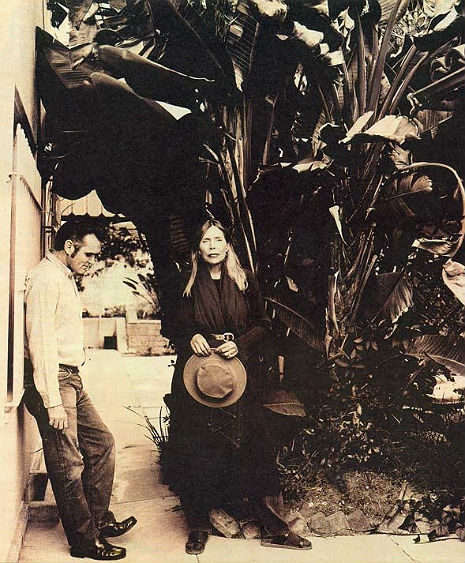
Fanboy Morrissey, who counts her masterpiece Blue among his favorite albums, interviews the great Joni Mitchell on NPR around the time that her matching Hits and Misses anthologies came out in fall of 1996.
From his very first question, Mozzer really hits the ball right out of the park:
Morrissey: Do they still refer to you as a female songwriter? Because it’s such a ludicrous—well, it’s become such a ludicrous title because to be called a female songwriter—
JM: Implies limitations.
Morrissey: Well, it implies that it’s not a real songwriter.
JM: Yeah.
Morrissey: I mean, you couldn’t imagine, for instance, saying Paul McCartney’s a great male songwriter.
JM: Right. Well, they wouldn’t do it that way. But I mean this has always been true of women in the arts. We supposedly made some progress in this century. We got the vote for one thing. But if you take the female impressionists, there were several of them that were very good, and they were not really allowed to belong to the academy. There was an extra “A” in front of their name, associates of the academy. So—and it was said of them that they were incapable of really tackling the important issues that men could tackle, that, you know, not that the subject matter of the impressionists was particularly important. It was just mostly delightful it seemed to me, people boating, people on beaches, you know, landscapes, so on. But they seemed to think that women could only handle domestic situations. And Mary Cassat painted women and children very beautifully, and that seemed to confirm it, but she had all the chops that they did.
One would think in this time period that I came along—mind you, there weren’t very many women writing and singing. There weren’t as many women as there are in the business now definitely. There were only a few of us—
Morrissey: But to use the expression “female songwriter” is to imply that the word songwriter belongs to men.
JM: Yes.
Morrissey: So do they still in this country call you call you a female songwriter?
JM: Well, they tend to lump me always with groups of women. You know, the women of rock. I’ve been always lumped in—I always thought, well, they don’t put Dylan with the men of rock. Why do they do that with me, with the women of rock, always within the context of the women that were happening within every decade I would get lumped in in that same manner.
One of my favorite compliments that I ever received was from a Black blind piano player, Henry, I don’t know what his last name was. And said to me, “Joni, you know, you make genderless, raceless music.” And I thought, well, I hadn’t set out, you know, saying “I’m going to make genderless, raceless music,” but in some part of the back of my mind, I did want to make music that crossed—I never really liked lines, class lines, you know, like social structure lines since childhood, and there were a lot of them that they tried to teach me as a child. “Don’t go there.” “Why not?” “Well, because they’re not like us.” They try to teach you those lines. They start at about 12. And I ignored them always and proceeded without thinking that I was a male or a female or anything, just that I knew these people that wrote songs and I was one of them.
Mitchell goes on to describe meeting John Lydon in Jamaica in 1977! Pure pleasure. There’s a transcript here.